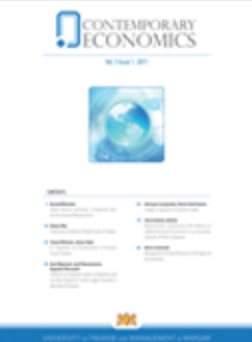Does Okun’s Law Exist in Nigeria? Evidence from the ARDL Bounds Testing Approach
Does Okun’s Law Exist in Nigeria? Evidence from the ARDL Bounds Testing Approach
Author(s): Nurudeen AbuSubject(s): Geography, Regional studies, National Economy, Energy and Environmental Studies, Labor relations, Evaluation research, Economic development, Post-War period (1950 - 1989), Transformation Period (1990 - 2010), Present Times (2010 - today)
Published by: VIZJA University
Keywords: Unemployment; Output growth; Okun’s law; Nigeria; ARDL;
Summary/Abstract: This study employs the autoregressive distributed lag (ARDL) bounds testing technique to examine whether Okun’s law exists in Nigeria during 1970-2014. In addition, this study considers the role of oil prices in the Nigerian economy. The empirical results indicate that a cointegrating or long term relationship exists between the unemployment rate, economic growth and oil prices. In addition, the results demonstrate that in Nigeria, in the long term, unemployment has a negative and significant effect on economic growth, and oil prices have a significant and positive effect on economic growth. The coefficient of unemployment (0.18%) for this study is far less than the result reported by Okun and other studies that focused on developed countries. This suggests that the Okun coefficient is not only unstable but varies for different countries, and does not remain constant for Nigeria. However, policymakers should take steps to reduce unemployment to enhance economic growth in Nigeria.
Journal: Contemporary Economics
- Issue Year: 11/2017
- Issue No: 2
- Page Range: 131-144
- Page Count: 14
- Language: English

